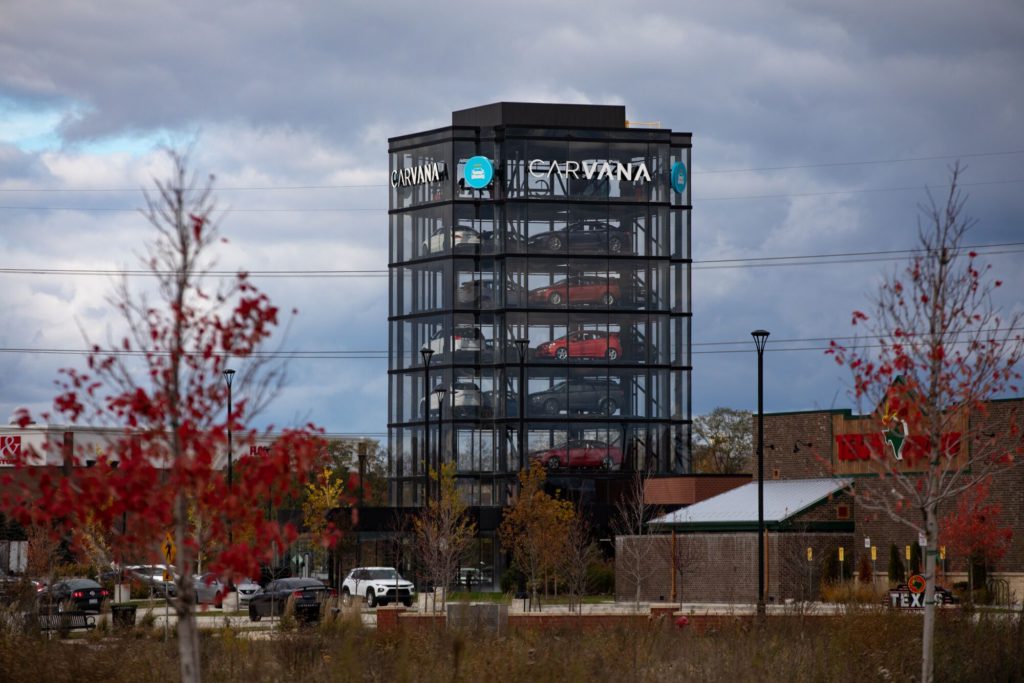Carvana Co. will restructure its debt and sell shares as the used-car retailer tries to regain its footing following a pandemic boom and bust.
(Bloomberg) — Carvana Co. will restructure its debt and sell shares as the used-car retailer tries to regain its footing following a pandemic boom and bust.
The agreement with bondholders announced Wednesday will eliminate about 83% of Carvana’s 2025 and 2027 unsecured note maturities and lower required cash interest expense by $430 million a year for the next two years. The company expects to reduce its total debt outstanding by more than $1.2 billion.
The deal — supported by key creditors including Apollo Global Management Inc. — sent Carvana shares soaring as much as 43% before paring the gain. The shares were up 26% at 9:43 a.m. in New York.
The moves are breakthroughs in Carvana’s efforts to get a handle on its debilitating debt load, following an ill-fated expansion during the pandemic. The company borrowed billions of dollars to capitalize on surging demand for used cars, only for the market to slow recently amid higher interest rates and rebounding new-vehicle production.
What Bloomberg Intelligence Says
Carvana’s plans to reduce debt outstanding by $1.2 billion and issue common stock is a needed step in building a balance sheet that will enable it to be a going concern, though will likely lead credit raters to initially move their ratings to selective default.
— Joel Levington, BI director of credit research
Click here to read the research.
The latest steps improved the auto seller’s long-term odds of survival, Michael Montani, an analyst with Evercore ISI, said in a note. “Much work remains on the path to sustainable, attractive shareholder returns, yet credit the company” for improving profitability and cutting costs against “a challenging used-car retailing backdrop.”
Carvana on Wednesday also reported better-than-expected second-quarter earnings and filed to sell the greater of 35 million shares or $1 billion of stock. For the quarter, the company beat estimates with a $105 million net loss. The deficit of 55 cents a share was less than half the $1.12 a share loss analysts were expecting.
By reducing interest expense, the debt restructuring will help lower one of the company’s biggest hurdles to achieving positive net income, which Carvana has never posted. The company reported adjusted earnings before interest, taxes, depreciation and amortization of $155 million.
Interest expense of $155 million amounted to more than $2,000 per car in the period.
Carvana has also throttled back growth to get a hand on its debt and losses. The retailer sold 76,530 cars in the quarter, a decline of 35%, and revenue fell 24% to just under $3 billion.
The company was able to boost gross profit per unit to $6,520, which was more than double from a year ago. That total was helped by $900 a vehicle in non-recurring items, the company said.
Management has also been focused on reducing expenses, especially selling, general and administrative costs. Its SG&A costs as a percentage of revenue fell from 18.6% a year ago to 15.2% in the recent quarter.
New Classes
The unsecured notes in the restructuring agreement are being swapped for three new classes of secured debt, which are higher up in the repayment line as they are backed by Carvana and Adesa assets, according to the statement. The new bonds start maturing in December 2028 and interest can be paid with more debt.
The company moved Adesa, a wholesale vehicle marketplace it acquired in 2022, into an unrestricted subsidiary in March, which often lays the groundwork for the issuance of new debt tied to the asset. The deal was reached with a group representing more than 90% of the company’s senior unsecured notes outstanding, including Apollo, Pacific Investment Management Co., Ares Management Corp. and the ad-hoc group of noteholders.
Apollo said in the statement that the agreement will “significantly strengthen Carvana’s financial position while providing creditors with new first lien debt.”
Apollo and Pimco banded together last year to gear up for a potential restructuring. The group opposed an earlier $1 billion debt swap the company launched in March, and later canceled.
–With assistance from Craig Trudell.
(Updates with share trading, analyst comment beginning in third paragraph)
More stories like this are available on bloomberg.com
©2023 Bloomberg L.P.










